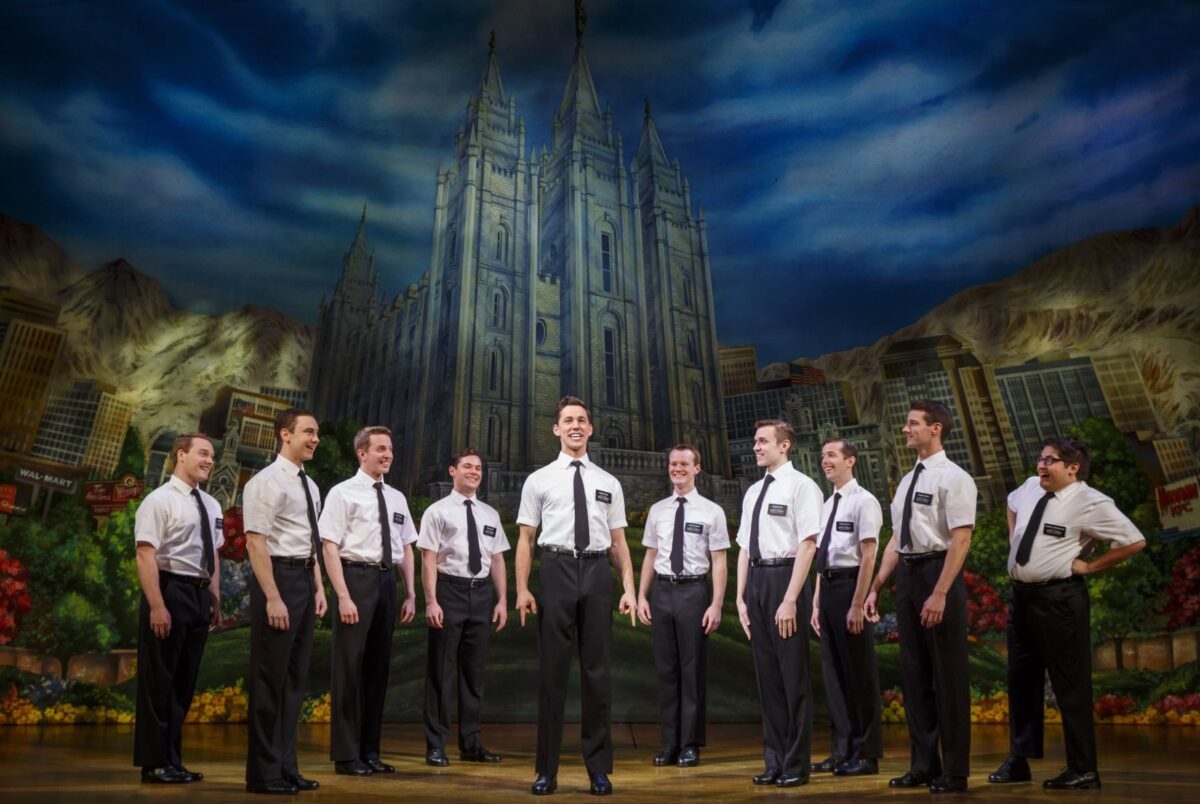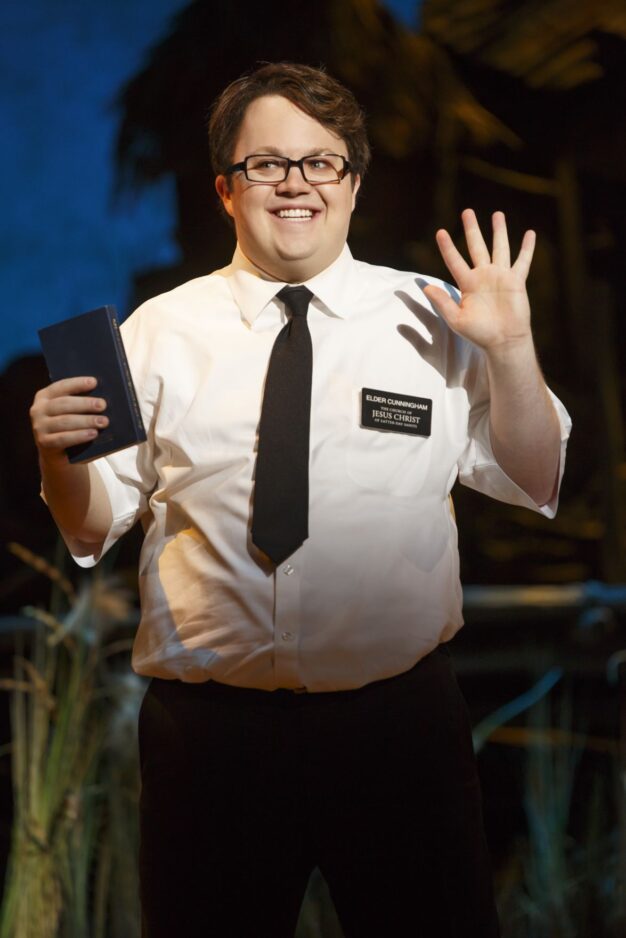A ‘real Mormon’ reviews ‘The Book of Mormon’ musical
The writers of “The Book of Mormon” musical focus their story on two groups of people, but it is clear from the text that they, themselves, are outsiders of both groups.
The first group (and the one that gets the most respectful, nuanced and researched treatment in the play) are missionaries of The Church of Jesus Christ of Latter-day Saints. The second group, getting painted with more stereotypical simplicity, are poverty-stricken Ugandans.
I don’t take issue with the fact that Trey Parker, Matt Stone and Robert Lopez have brought forth a text that uses a people and culture other than their own to explore big, important, life-affirming ideas — I would argue that Joseph Smith did the same thing with the real Book of Mormon, which, as a text, features Native American characters presented through a white, 19th century lens.
As a Mormon myself, I appreciate the outsider perspective that Parker, Stone and Lopez bring, which extends not only from Mormonism but, it would appear, from all religious doctrine. The musical is an atheist’s “Fiddler on the Roof,” at its core being less interested in interrogating the nuances of a Mormon mission experience than that of a faith crisis in any tradition.
What the show ultimately lands on as the resolution to a disillusioning crisis of faith is surprisingly pious for a show that, by design, could not imaginably be more profane. But the profanity is purposeful, because this isn’t just a story about faith, it’s about what faith does when pitted against overwhelming contradiction.
The story centers around an odd couple Mormon missionary pair — the rigid and confident Elder Price and the flexible and goofy Elder Cunningham — who gets sent from the Provo MTC to a village in Uganda that is afflicted with famine, disease and violence.
Faced with the culture shock and a message that isn’t resonating, they meet up with other missionaries in their district, who themselves have all but given up hope of fulfilling their missions.
Those elders (a line of chorus boys as rousing and delightful as any in Broadway history, thank you very much) have adopted “a nifty little Mormon trick” for facing discouragement: They put their doubts and concerns on a metaphorical shelf, smile and keep going and, as they put it in song (and tap dance), they simply “Turn It Off.”
Well, that approach for handling complexity doesn’t turn out to be especially effective in the long run (especially for the closeted gay district leader who constantly agonizes in a wrestle with his “hetero side,” as he calls it), and eventually Elder Cunningham comes up with a different (and from the musical’s perspective, better) plan for handling such crises: He doesn’t stifle the incongruities, he simply throws them out, improvising and injecting new flourishes into the faith, adapting to whatever circumstances arise.
The problem with that approach is that religious faith doesn’t always take well to Cunninghamian flexibility, and the whole thing sets up a tenuous predicament for his most eager new convert, a young woman named Nabulungi, whose ultra-literal interpretations of the missionary’s stories set up, for her, an ontological timebomb.
Being a Mormon who has long navigated a path of continued faith that has nevertheless been no stranger to crisis and disillusionment along the way, this musical is like a precious gift to my own most personal and unrepresented experiences. If I were building a case that my life were a “Truman Show”-esque facade, built entirely around my private thoughts and my experiences, this musical would be Exhibit A.
This personal affinity was hard to contain when I finally saw the show on Broadway. Standing in line from the crack of dawn to try for inexpensive lottery or standing-room-only tickets, I was eager to tell both my fellow line campers and, eventually, anyone inside the theater who seemed like they might be interested that I was “a real Mormon.” (Fellow real Mormons who disapprove of my excitement about this show might call that label into question, but I claim it confidently.)
That said, I am not without reservations about the musical. While I applaud the open-mindedness of a Cunninghamian approach to avoid religious dogmatism, I’m still an adherent to the Book of Mormon passage (that is, from the book) that promotes placing faith in unseen things only with the caveat that such things “are true” (Alma 31:21).
That caveat makes me uncomfortable with the flagrant promotion of flat-out made-up stories, at least without giving those stories proper contextualization in a mythological framework.
Without going into all the plot details and fun reveals, it turns out by the end of the show that most of Elder Cunningham’s converts are fully equipped with such a framework, rendering his imaginative prophecies perfectly palatable, even of great use and value.
As enjoyable an experience as it was to see “The Book of Mormon” in New York City (which I have done three times), the absolute best possible place to see it is Salt Lake City — which might explain why the touring production, now playing, has a run a few days longer than most Broadway at the Eccles touring engagements.
For one thing, the play might be a solid five minutes longer here, as jokes that fly by a New York audience land in the Eccles Theater with the extra applause of recognition. The show has a song named after the city, which would have been the highlight of the night for me, were it not for a spoken reference to the city late in the show that is so brilliant that it’s always my favorite line of the show — but in Salt Lake City itself, the line achieves next-level insight and hilarity.
Whatever dark places the story takes its characters, “The Book of Mormon” ends on a high of genuine, cheesy, totally earned optimism (an emotional departure from the destruction-laden final chapters of the original source, now that I think of it). I enjoyed eavesdropping on my fellow theatergoers, all sharing in the high of the moment. (My favorite overheard moment from the unique Salt Lake City crowd: a man saying, “It made me sad I didn’t go on a mission!”)
While I don’t accept the entire philosophical underpinning of “The Book of Mormon” (the musical — well, the book too, when I remember one particular plot point regarding skin color, which the musical hilariously pokes at), there is one part of the show’s philosophy that I do embrace, being sympathetic to other Mormons who won’t. It’s summed up by something one missionary says late in the show:
“We’re all Latter-day Saints. Even if we’ve changed some things, or we break the rules, or we have complete doubt that God exists.”
Each time I have seen the show, that line, and the Broadway-at-its-finest celebratory musical number that follows it, makes me feel something real, even spiritual. No, the message isn’t perfect, and neither are the characters. But they’re using a faith tradition that I call home to reach more deeply into themselves and find compassion for others. They use it, or at least a version of it, to engage with the challenges of life with arms — and eyes — wide open.
And I can give an “Amen” to that.
THE BOOK OF MORMON
What: Touring Broadway production
When: Plays at various times through Aug. 20
Where: Eccles Theater, 131 S. Main St., Salt Lake City
Tickets: $35-$185
Info: broadway-at-the-eccles.com




